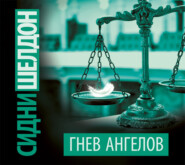По всем вопросам обращайтесь на: info@litportal.ru
(©) 2003-2024.
✖
Windmills of the Gods
Автор
Год написания книги
2018
Настройки чтения
Размер шрифта
Высота строк
Поля
‘Yes, Mr President?’
Paul Ellison turned to Rogers. ‘Coffee?’
‘Sounds good.’
‘Want anything with it?’
‘No, thanks. Barbara wants me to watch my waistline.’
The President nodded to Henry, the steward, and he quietly left the room.
Barbara. She had surprised everyone. The gossip around Washington was that the marriage would not last out the first year. But it had been almost fifteen years now, and it was a success. Stanton Rogers had built up a prestigious law practice in Washington, and Barbara had earned the reputation of being a gracious hostess.
Paul Ellison rose and began to pace. ‘My people-to-people speech seems to have caused quite an uproar. I suppose you’ve seen all the newspapers.’
Stanton Rogers shrugged. ‘You know how they are. They love to build up heroes so they can knock them down.’
‘Frankly, I don’t give a damn what the papers say. I’m interested in what people are saying.’
‘Quite candidly, you’re putting the fear of God into a lot of people, Paul. The armed forces are against your plan, and some powerful movers and shakers would like to see it fail.’
‘It’s not going to fail.’ He leaned back in his chair. ‘Do you know the biggest problem with the world today? There are no more statesmen. Countries are being run by politicians. There was a time not too long ago when this earth was peopled with giants. Some were good, and some were evil – but, by God, they were giants. Roosevelt and Churchill, Hitler and Mussolini. Charles de Gaulle and Joseph Stalin. Why did they all live at that one particular time? Why aren’t there any statesmen today?’
‘It’s pretty hard to be a world giant on a twenty-one-inch screen.’
The door opened and the steward appeared, bearing a silver tray with a pot of coffee and two cups, each imprinted with the Presidential seal. He skilfully poured the coffee. ‘Can I get you something else, Mr President?’
‘No. That’s it, Henry. Thank you.’
The President waited until the steward had gone. ‘I want to talk to you about finding the right Ambassador to Romania.’
‘Right.’
‘I don’t have to tell you how important this is. I want you to move on it as quickly as possible.’
Stanton Rogers took a sip of his coffee and rose to his feet. ‘I’ll get State on it right away.’
In the little suburb of Neuilly, it was 2 a.m. Marin Groza’s villa lay in ebon darkness, the moon nested in a thick layer of storm clouds. The streets were hushed at this hour, with only the sound of an occasional passer-by rippling the silence. A black-clad figure moved noiselessly through the trees towards the brick wall that surrounded the villa. Over one shoulder he carried a rope and a blanket, and in his arms was cradled an Uzi with a silencer and a dart gun. When he reached the wall, he stopped and listened. He waited, motionless, for five minutes. Finally, satisfied, he uncoiled the nylon rope and tossed up the scaling hook attached to the end of it until it caught on the far edge of the wall. Swiftly, the man began to climb. When he reached the top of the wall, he flung the blanket across it to protect himself against the poisoned-tip metal spikes embedded on top. He stopped again to listen. He reversed the hook, shifting the rope to the inside of the wall, and slid down into the grounds. He checked the balisong at his waist; the deadly Filipino folding knife that could be flicked open or closed with one hand.
The attack dogs would be next. The intruder crouched there, waiting for them to pick up his scent. There were three Dobermans, trained to kill. But they were only the first obstacle. The grounds and the villa were filled with electronic devices, and continuously monitored by television cameras. All mail and packages were received at the gatehouse and opened there by the guards. The doors of the villa were bomb-proof. The villa had its own water supply, and Marin Groza had a food taster. The villa was impregnable. Supposedly. The figure in black was here this night to prove that it was not.
He heard the sounds of the dogs rushing at him before he saw them. They came flying out of the darkness, charging at his throat. There were two of them. He aimed the dart gun and shot the nearest one on his left first, and then the one on his right, dodging out of the way of their hurtling bodies. He spun around, alert for the third dog, and when it came, he fired again, and then there was only stillness.
The intruder knew where the sonic traps were buried in the ground, and he skirted them. He silently glided through the areas of the grounds that the television cameras did not cover, and in less than two minutes after he had gone over the wall, he was at the back door of the villa.
As he reached for the handle of the door, he was caught in the sudden glare of half a dozen floodlights. A voice called out, ‘Freeze! Drop your gun and raise your hands.’
The figure in black carefully dropped his gun and looked up. There were half a dozen men spread out on the roof, with a variety of weapons pointed at him.
The man in black growled, ‘What the fuck took you so long? I never should have got this far.’
‘You didn’t,’ the head guard informed him. ‘We started tracking you before you got over the wall.’
Lev Pasternak was not mollified. ‘Then you should have stopped me sooner. I could have been on a suicide mission with a load of grenades or a god-damn mortar. I want a meeting of the entire staff tomorrow morning, eight o’clock sharp. The dogs have been stunned. Have someone keep an eye on them until they wake up.’
Lev Pasternak prided himself on being the best security guard in the world. He had been a pilot in the Israeli six-day war and, after the war, had become a top agent in Mossad, one of Israel’s five secret services.
He would never forget the morning, two years earlier, when his colonel had called him into his office.
‘Lev, someone wants to borrow you for a few weeks.’
‘I hope it’s a blonde,’ Lev quipped.
‘It’s Marin Groza.’
Mossad had a complete file on the Romanian dissident. Groza had been the leader of a popular Romanian movement to depose Alexandros Ionescu and was about to stage a coup when he had been betrayed by one of his men. More than two dozen underground fighters had been executed, and Groza had barely escaped the country with his life. France had given him sanctuary. Ionescu denounced Marin Groza as a traitor to his country and put a price on his head. So far half a dozen attempts to assassinate Groza had failed, but he had been wounded in the latest attack.
‘What does he want with me?’ Pasternak asked. ‘He has government protection.’
‘Not good enough. He needs someone to set up a fool-proof security system. He came to us. I recommended you.’
‘I’d have to go to France?’
‘It will only take you a few weeks.’
‘I don’t –’
‘Lev, we’re talking about a mensch. He’s the guy in the white hat. Our information is that he has enough popular support in his home country to knock over Ionescu. When the timing is right, he’ll make his move. Meanwhile, we have to keep the man alive.’
Lev Pasternak thought about it. ‘A few weeks, you said?’
‘That’s all.’
The Colonel had been wrong about the time, but he had been right about Marin Groza. He was a thin, fragile-looking man with an ascetic air about him and a face etched with sorrow. He had an aquiline nose, a firm chin, and a broad forehead, topped by a spray of white hair. He had deep, black eyes, and when he spoke, they blazed with passion.
‘I don’t give a damn whether I live or die,’ he told Lev at their first meeting. ‘We’re all going to die. It’s the when that I’m concerned about. I have to stay alive for another year or two. That’s all the time I need to drive Ionescu out of my country.’ He ran his hand absently across a livid scar on his cheek. ‘No man has the right to enslave a country. We have to free Romania and let the people decide their own fate.’
Lev Pasternak went to work on the security system at the villa in Neuilly. He used some of his own men, and the outsiders he hired were checked out thoroughly. Every single piece of equipment was state-of-the-art.
Pasternak saw the Romanian rebel leader every day, and the more time he spent with him, the more he came to admire him. When Marin Groza asked Pasternak to stay on as his security chief, Pasternak did not hesitate.
‘I’ll do it,’ he said, ‘until you’re ready to make your move. Then I will return to Israel.’
They struck a deal.
At irregular intervals, Pasternak staged surprise attacks on the villa, testing its security. Now, he thought: Some of the guards are getting careless. I’ll have to replace them.
He walked through the hallways, carefully checking the heat sensors, the electronic warning systems, and the infrared beams at the sill of each door. As he reached Marin Groza’s bedroom, he heard a loud crash, and a moment later Groza began screaming out in agony.

















